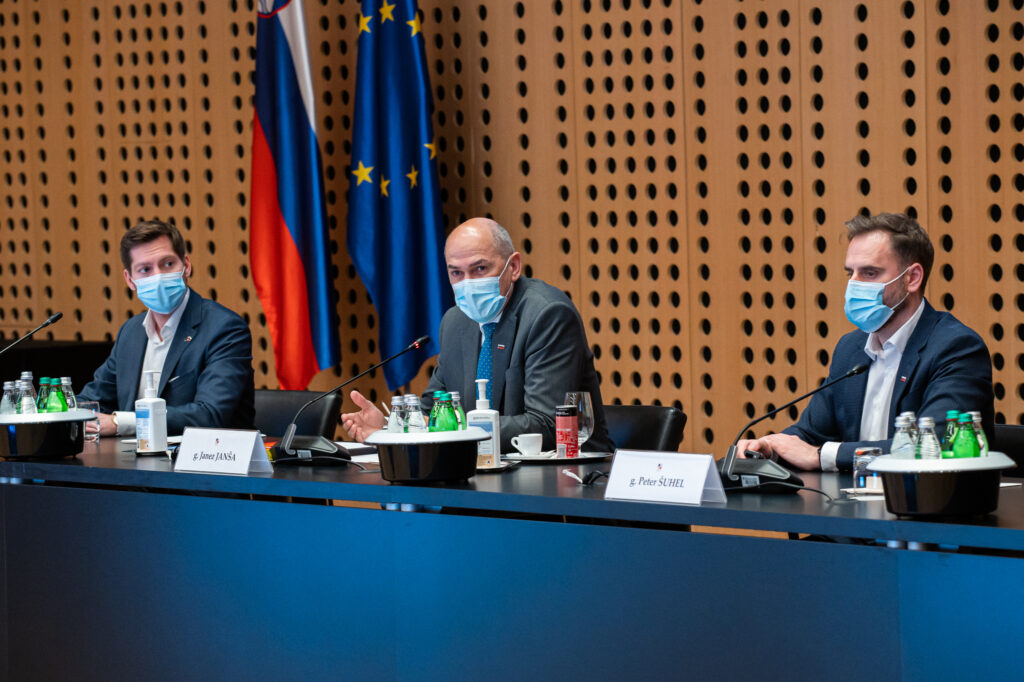Slovenia has taken a serious step forward in the process of the digital transformation of society, which the foreign media have also reported on. The first step was the recent introduction of digital vignettes, and starting next year, the drivers’ licences will also become digital. Croatia, for example, plans to introduce digital drivers’ licences in 2033. Slovenia’s digital ambitions are evidenced by the fact that according to the Digital Economy and Society Index (DESI), which monitors Europe’s overall digital performance, Slovenia ranked 13th in 2021, with a growth trend, which thus means that it is above the European average. At this rate, the government predicts that in 2030, Slovenia will be among the top three countries on the DESI index, thus overthrowing Denmark, Sweden or Finland from the throne of the digital champion of Europe.
Slovenia is eighth in Europe in the published index when it comes to the inclusion of digital technology in business transactions. According to the world’s most prestigious scale of digital governments, prepared by the Japanese University of Waseda, Slovenia ranked as the solid 23rd in the world in 2021. According to foreign media reports, our neighbouring country Croatia is much lower on the same scale, lower than 50th place.
We have great plans
Digital vignettes and driving licences are only part of the plan, as Prime Minister Janez Janša made it clear at the recent press conference that he sees Slovenia as a country that should benefit greatly from investing in cryptocurrencies and information security, and that any replacement of obsolete paper with digital identification raises Slovenia on the scale and thus makes it more attractive to potential investors. The digital transformation plan includes an investment of 26.5 million euros (30 million dollars) for the implementation of the digital transformation strategy in 2022, 24 million euros in 2023, and 6 million euros in 2024, in cooperation with the Slovenian Business Development Agency (SPIRIT Slovenia, public agency), Slovene Enterprise Fund, and the SID Bank (Slovenian Export and Development Bank). In January, the government announced tenders for digital transformation and hybrid cloud. It will invest 44 million euros in the former and 2.5 million euros in the latter, and the conditions for the tender worth 10 million euros for projects of common interest of the EU will be published in the second quarter of 2022. In April 2021, the European Parliament adopted the Digital Europe Programme, the first financial instrument in the EU which is specifically dedicated to the introduction of technology to businesses and citizens.
The first petascale supercomputer and advanced artificial intelligence
Slovenia can now boast with the first petascale supercomputer in the country (the term petascale refers to a computer system that can calculate at least 10¹⁵ operations with a moving point per second), HPC Vega, which has been in use since 2020, and the state has also launched a national test blockchain infrastructure called SI-Chain, which should enable testing of existing and new blockchain applications for the public and private sector. Blockchain technology allows for safer and faster transactions that stay recorded and are almost impossible to change. The individual blocks that form a whole together contain information about the previous block. This information stores the time of the transaction and not the data about the transaction itself.
In June 2020, Slovenian launched the Global Artificial Intelligence Partnership Initiative (GPAI), which promotes the responsible use and development of artificial intelligence and encourages investments that respect human rights and diversity. A year later, the National Cyber Incident Response Plan (Nacionalni načrt za odzivanje na kibernetske incidente – NCIRP) was adopted, unifying cyber incident management and providing guidelines for a coordinated response. The aforementioned index also states that it is clear that Slovenia intends to continue with its efforts to digitalise operations, with special emphasis on small and medium-sized enterprises.
The Government Office for Digital Transformation is in charge of the digital transformation
The Government Office for Digital Transformation, headed by Mark Boris Andrijanič, was established for the purpose of consistent implementation of digitalisation in the field of 40 concrete measures related to health, education, public administration and the economy, with which Slovenia would become one of the most advanced countries in Europe. However, digitalisation is not only an opportunity for large-scale business investments but also a means of generating European Union profits. Namely, we could get 1.8 billion euros in grants and 705 million euros in favourable loans from the Recovery and Resilience Fund, and digitalisation is a key point of the Slovenian programme for recovery and resilience.
“We have many challenges to face when it comes to digital inclusion, as only 55 percent of the adult population in Slovenia has basic digital skills. This is absolutely not enough for us to be able to effectively integrate into the digital society. The economy is very advanced in this area. We are in eighth place when it comes to the use of digital technologies in companies, though,” Andrijanič told the media.
In terms of human capital, Slovenia ranks 13th in the EU. According to experts, Slovenian human capital is one of the country’s greatest advantages, as we have a large number of graduated STEM experts, and the number of ICT start-ups is above the EU average. Fifty-five percent of people aged 16 to 74 have at least the basic digital skills, which is the European average. The share of ICT professionals in 2021 amounted to 4.4 percent of the workforce, compared to 3.9 percent from a year ago, and women represent 17 percent of all ICT professionals.
Tanja Brkič


